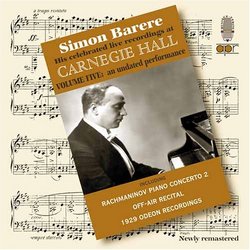| All Artists: Sergey Rachmaninov, Domenico Scarlatti, Frederic Chopin, Franz Liszt, Alexander Scriabin, Spoken Word, Antonia Brico, Simon Barere Title: Simon Barere Carnegie Hall Recordings, Vol. 5; An undated performance Members Wishing: 0 Total Copies: 0 Label: Apr UK Original Release Date: 1/1/2005 Re-Release Date: 11/8/2005 Album Type: Import Genres: Dance & Electronic, Special Interest, Classical Styles: Ballets & Dances, Polkas, Chamber Music, Forms & Genres, Concertos, Sonatas, Historical Periods, Baroque (c.1600-1750), Classical (c.1770-1830), Modern, 20th, & 21st Century, Instruments, Keyboard Number of Discs: 1 SwapaCD Credits: 1 UPC: 5024709156252 |
Search - Sergey Rachmaninov, Domenico Scarlatti, Frederic Chopin :: Simon Barere Carnegie Hall Recordings, Vol. 5; An undated performance
 | Sergey Rachmaninov, Domenico Scarlatti, Frederic Chopin Simon Barere Carnegie Hall Recordings, Vol. 5; An undated performance Genres: Dance & Electronic, Special Interest, Classical
|
Larger Image |
CD Details |
CD ReviewsThe Rachmaninov to buy if you think you know Rachmaninov Mike Simonsen | San Francisco, CA | 09/19/2006 (5 out of 5 stars) "The 1948 Gramophone Shop Encyclopedia lists recordings of the Rachmaninov 2nd Concerto by the composer, by Rubinstein, Moiseiwitsch, Gyorgy Sandor, Cyril Smith and Eileen Joyce. It is safe to say that none of these studio performances are jaw-droppingly virtuosic in quite the way that Simon Barere is here in live performance. The line we can draw between Liszt and Rachmaninov is shorter than you might think, and Barere forfeits none of his Russian heritage in shortening it further. Passagework that is clear, regular and awe-inspiring with Rachmaninov or Moiseiwitsch, becomes daring, insouciant and impulsive with Barere - he goes around corners on two wheels just as if he were rattling off Balakirev's "Islamey." Imagine a broadcast of a St. Petersburg premiere of a newly discovered Liszt's Fourth Piano Concerto. It doesn't hurt the music at all. Rachmaninov was full of praise for other pianists and other interpretations of his compositions. The only real impediment to enjoyment here is that the original broadcast engineer short-changes the orchestra. Antonia Brico's accompaniment is not equal to Stokowski's for Rachmaninov's own recording, but is probably better than Walter Goehr's for Moiseiwitsch. Unfortunately, we can't always hear the orchestra very clearly, as the piano is very close all the time. The date of broadcast is probably early 1940's. This may be one of those famous feverish wartime recordings, like the Furtwaengler Beethoven 9th. Perhaps it followed Rachmaninov's death in 1943. It is certainly intense, almost to the point of loopiness. With this CD, I did something I've never done before in my life - after hearing a Rachmaninov 2nd Piano Concerto, I turned around and listened to the whole thing again. You might, too." First-rate pianism! Hiram Gomez Pardo | Valencia, Venezuela | 12/21/2007 (5 out of 5 stars) "The sumptuous eloquence, pristine elegance, and that unsaid devilish technique conjugate themselves in order to confer to Simon Barere's admirable pianism that imperial status, so hard to get and feel in those days, in which the technique has become the highest achievement for several generations newcomers pianists. The main problem respect this ambitious approach is the lack of personal expression. That's why you may feel a sense of homogeneity, and flatness around many young and well known artists.
But returning to Barere, his ferrous conviction and prodigious refinement literally shaped the entire piece, like a sculptor shaping the raw material. This set is not only recommendable, but absolutely relevant and primordial in case you want to have the best of the best on which golden pianism concerns. Don't miss it. " |

 Track Listings (15) - Disc #1
Track Listings (15) - Disc #1